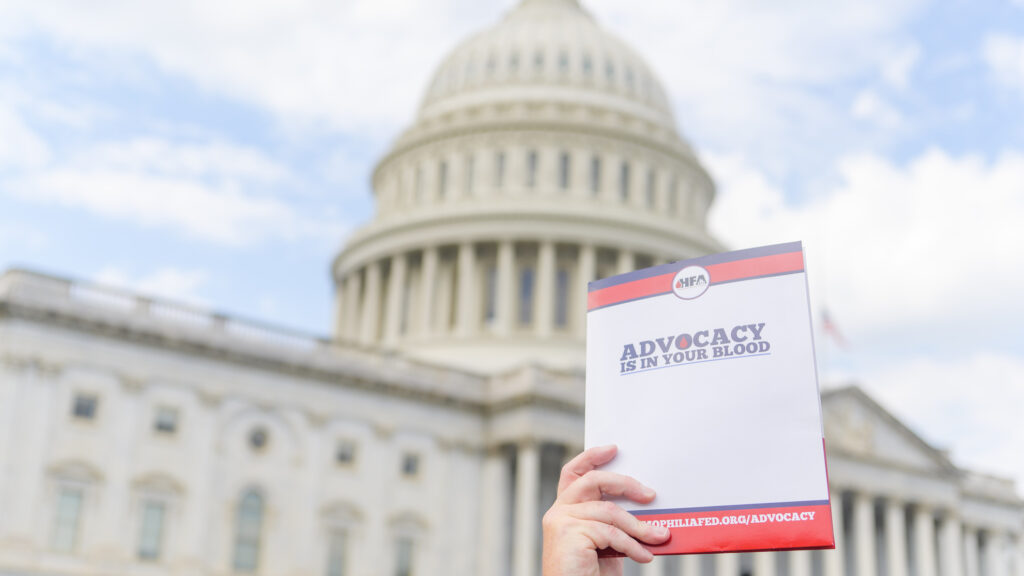Lawmakers in May devoted close attention to the role that pharmacy benefits managers (PBMs) play in our health care system.
PBMs are middlemen that create and administer drug formularies on behalf of health insurers, self-insured employers, Medicaid, and other payers. PBMs choose which drugs a plan will cover, negotiate drug prices on behalf of payers, and dictate drug benefit design (e.g., patient cost-sharing, prior authorization and step therapy requirements, etc.). Due to corporate consolidation in recent years, PBMs increasingly operate their own specialty pharmacies and have even acquired major health insurers. PBMs’ dominant role in the drug distribution chain has allowed them to adopt strategies, including copay accumulator adjusters and copay maximizers, that impact access to care for people with bleeding disorders and other serious health conditions.
Over the course of the past month, multiple Congressional committees held hearings and considered legislation to address the operations of these powerful middlemen. The HELP Copays Act (H.R. 830/S. 1375), one of HFA’s top legislative priorities, came up for consideration in two of those sessions. The Senate Committee on Health, Education, Labor and Pensions considered but ultimately declined to add S. 1375 to a broad package of PBM and drug pricing reforms that passed by bipartisan vote on May 11th. (Committee leadership decided that amendments without a score, i.e., a cost estimate, from the Congressional Budget Office would be deferred for possible later action; S. 1375 fell into this category.) On the other side of the Capitol, the House Energy and Commerce Health Subcommittee also advanced legislation designed to improve transparency and competition in health care during a May 17th markup. Rep. Buddy Carter, one of the lead sponsors of H.R. 830, introduced that measure as an amendment but subsequently withdrew it, reserving it for future work by the committee.
Across Congress, there is increasing bipartisan agreement on the need for greater transparency into PBM operations. That movement is helping to grow support for the HELP Copays Act, but advocates need to keep up the pressure. HFA has made it easy to contact your lawmakers in support of H.R. 830 and S. 1375 via our legislative action center. Please email your Congressional delegation today if you haven’t yet done so – and thank you for your advocacy and engagement!
Quick Hits:
- As we go to press, it appears that Congress and the Administration have agreed on a deal to avert a debt ceiling showdown and agree on a budget. In the run-up to that deal, there was widespread concern that the House of Representatives would include harmful provisions in the final legislation, cutting funding and creating new barriers to coverage under Medicaid via the implementation of so-called “work requirements.” Medicaid is critical to the bleeding disorder community, and past experience with work requirements has shown that extra paperwork drives dire coverage losses without boosting employment. We thank the many advocates who responded to HFA’s action alert and urged your lawmakers to #ProtectMedicaid!
- HFA and other patient groups are closely monitoring rates of paperwork terminations in the course of the ongoing Medicaid “unwinding.” Well over half of initial coverage losses reported in May in Arkansas, Indiana, and Florida (for example) were for procedural reasons, and not necessarily because the beneficiaries were no longer eligible. Patient groups are calling on state and federal agencies to use every process available to confirm that those enrollees losing coverage are in fact no longer eligible.
- HFA and other patient groups applauded a court decision staying a trial court ruling in Braidwood Management v. Becerra. No-cost coverage of certain preventive care services is at risk in the litigation, currently on appeal to the U.S. Court of Appeals for the Fifth Circuit.
- The public health emergency declared over COVID-19 formally ended in May, globally as well as domestically. The end of the U.S. PHE declaration means you may experience changes in insurance coverage for COVID-19 tests (over-the-counter and/or laboratory tests), or may no longer be able to participate in Medicare telehealth visits via technologies such as FaceTime and WhatsApp (certain other telehealth flexibilities remain in place through the end of the year or longer). The U.S. Drug Enforcement Administration, which initially proposed to end its PHE-related permission for doctors to prescribe controlled substances via telemedicine, has reversed course and decided to allow telehealth prescribing of controlled substances to continue for the time being.
- On May 11, the U.S. Food and Drug Administration released final guidance providing recommendations for evaluating blood and plasma donor eligibility using individual risk-based questions. Consistent with FDA’s January 2023 proposed guidance, the final guidance eliminates time-based donation deferrals and screening questions specific to men who have sex with men (MSM) and women who have sex with MSM.




